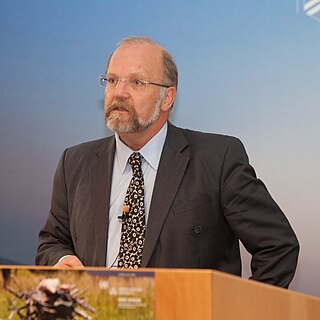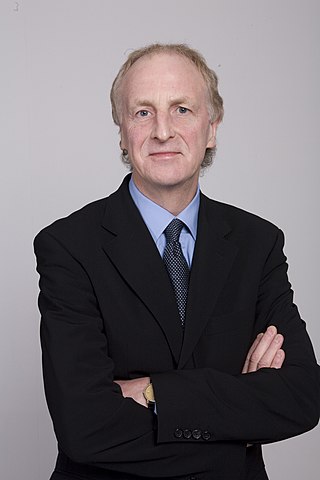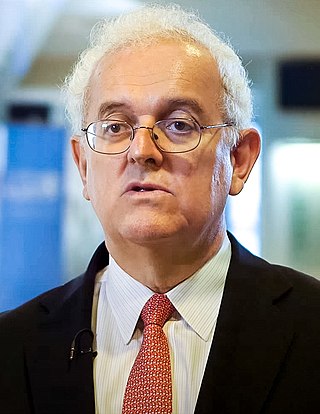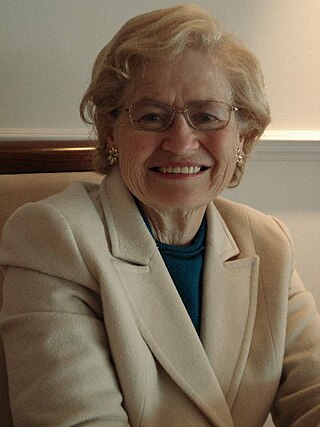
Economics is the social science that studies the production, distribution, and consumption of goods and services.

Economic growth can be defined as the increase or improvement in the inflation-adjusted market value of the goods and services produced by an economy in a financial year. Statisticians conventionally measure such growth as the percent rate of increase in the real gross domestic product, or real GDP.

The University of Florence is an Italian public research university located in Florence, Italy. It comprises 12 schools and has around 50,000 students enrolled.
Frances Julia Stewart is professor emeritus of development economics and director of the Centre for Research on Inequality, Human Security and Ethnicity (CRISE), University of Oxford. A pre-eminent development economist, she was named one of fifty outstanding technological leaders for 2003 by Scientific American. She was president of the Human Development and Capability Association from 2008–2010.
Structuralist economics is an approach to economics that emphasizes the importance of taking into account structural features (typically) when undertaking economic analysis. The approach originated with the work of the Economic Commission for Latin America and is primarily associated with its director Raúl Prebisch and Brazilian economist Celso Furtado. Prebisch began with arguments that economic inequality and distorted development was an inherent structural feature of the global system exchange. As such, early structuralist models emphasised both internal and external disequilibria arising from the productive structure and its interactions with the dependent relationship developing countries had with the developed world. Prebisch himself helped provide the rationale for the idea of Import substitution industrialization, in the wake of the Great Depression and World War II. The alleged declining terms of trade of the developing countries, the Singer–Prebisch hypothesis, played a key role in this.
The United Nations University World Institute for Development Economics Research (UNU-WIDER) is part of the United Nations University (UNU). UNU-WIDER, the first research and training centre to be established by the UNU, is an international academic organization set up with the aim of promoting peace and progress by bringing together leading scholars from around the world to tackle pressing global problems.

Deepak Nayyar is an Indian economist and academician. He is a professor of economics at Jawaharlal Nehru University, New Delhi and Chairperson of the Board of Governors of Centre for the Study of Developing Societies (CSDS) New Delhi. He has taught at the University of Oxford, the University of Sussex, the Indian Institute of Management Calcutta (IIM-C), and the New School for Social Research, New York City. He was Vice Chancellor of the University of Delhi from 2000 to 2005.
Rural poverty refers to poverty in rural areas, including factors of rural society, rural economy, and political systems that give rise to the poverty found there. Rural areas, because of their spread-out populations, typically have less well maintained infrastructure and a harder time accessing markets, which tend to be concentrated in population centers.

Mary Henrietta Kaldor is a British academic, currently Professor of Global Governance at the London School of Economics, where she is also the Director of the Civil Society and Human Security Research Unit. She also teaches at the Institut Barcelona d'Estudis Internacionals (IBEI). She has been a key figure in the development of cosmopolitan democracy. She writes on globalisation, international relations and humanitarian intervention, global civil society and global governance, as well as what she calls New Wars.

Sir Arthur "Richard" Jolly, is a leading development economist who was named one of the fifty key thinkers globally in this field of economics.
Robert Hunter Wade is a political economy and development scholar. He has been Professor of Global Political Economy at the Department of International Development, London School of Economics since 1999.

Sugata Marjit is the former Vice Chancellor of the University of Calcutta and currently the First Distinguished Professor at Indian Institute of Foreign Trade and the Project Director of Centre for Training & Research in Public Finance and Policy (CTRPFP) [A Ministry of Finance, Government of India funded initiative]. He is a Ph.D. at the University of Rochester and currently the Editor of South Asian Journal of Macroeconomics and Public Finance. He used to be the Director of Centre for Studies in Social Sciences, Calcutta from March 2007 to March 2012 and Reserve Bank of India Chair Professor of Industrial Economics at CSSSC till September, 2019. On 15 July 2015 he took the charge as an interim Vice-Chancellor of the prestigious University of Calcutta, Kolkata, India.

Finn Tarp is a Danish Professor of Development Economics at the University of Copenhagen and former Director of UNU-WIDER (2009-2018), Helsinki, Finland.

Anthony F. Shorrocks is a British development economist.

José Antonio Ocampo Gaviria is a Colombian writer, economist and academic who was the professor of professional practice in international and public affairs and director of the Economic and Political Development Concentration at the School of International and Public Affairs at Columbia University from July 2007 to August 2022. Prior to his appointment, Ocampo served in a number of positions in the United Nations and the Government of Colombia, most notably in the United Nations as Under-Secretary-General for Economic and Social Affairs and Executive Secretary for the Economic Commission for Latin America and the Caribbean, and in Colombia as Minister of Finance and Public Credit and Minister of Agriculture and Rural Development.

The Barcelona Development Agenda is a statement of development principles formulated as a response to the prevailing Washington Consensus development model. Resulting from the collaboration of economists from both developing and developed countries at the 2004 Universal Forum of Cultures in Barcelona, Spain, the Barcelona Development Agenda outlines seven lessons learned from previous policy failures and successes, and presents them as priorities for future economic reforms. The principles emphasize a balance of market and government economic roles, flexible economic tools, and an increased role for sustainability and equity in governance.

Stephany Griffith-Jones is an economist specialising in international finance and development, with emphasis on reform of the international financial system, specifically in relation to financial regulation, global governance and international capital flows. She is currently member of the Governor Board at the Central Bank of Chile. She has been financial markets director at the Initiative for Policy Dialogue, based at Columbia University in New York and associate fellow at the Overseas Development Institute. Previously she was professorial fellow at the Institute of Development Studies at Sussex University. She has held the position of deputy director of International Finance at the Commonwealth Secretariat and has worked at the United Nations Department of Economic and Social Affairs and in the United Nations Economic Commission for Latin America and the Caribbean. She started her career in 1970 at the Central Bank of Chile. Before joining the Institute of Development Studies, she worked at Barclays Bank International in the UK. She has acted as senior consultant to governments in Eastern Europe and Latin America and to many international agencies, including the World Bank, the Inter-American Development Bank, the European Commission, UNICEF, UNDP and United Nations Conference on Trade and Development. She was also a member of the Warwick Commission on international financial reform. She has published over 20 books and written many scholarly and journalistic articles. Her latest book, edited jointly with José Antonio Ocampo and Joseph Stiglitz, Time for the Visible Hand, Lessons from the 2008 crisis, was published in 2010.

Rolph Eric van der Hoeven is emeritus professor on employment and development economics at the International Institute of Social Studies in The Hague and was appointed in 2009 as a member of the Committee on Development Cooperation of the International Advisory Council (AIV) to the Dutch Government. Dr. van der Hoeven is a member of the Board of Trustees of the KNCV Tuberculosis Fund.
Séverine Marie Paule Deneulin is a senior lecturer in International Development at the Department of Social and Policy Sciences, University of Bath, and a fellow of the Human Development and Capability Association (HDCA); she is also the HDCA's secretary with a place on the executive council.
Sanjiv M. Ravi Kanbur, is T.H. Lee Professor of World Affairs, International Professor of Applied Economics, and Professor of Economics at Cornell University. He worked for the World Bank for almost two decades and was the director of the World Development Report.














